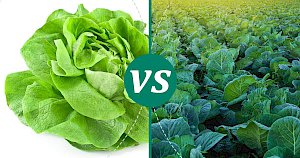Fodder Cabbage vs Lettuce: Nutrition Showdown
Where is more calories, protein, carbs - what is more healthy?


Lettuce vs Fodder cabbage: Nutrition Comparison
| per 100g | Fodder cabbage | Lettuce |
|---|---|---|
| Calories | 32 | 15 |
| Carbohydrates | 5.42 g | 2.87 g |
| Fat | 0.61 g | 0.15 g |
| Dietary fiber | 4 g | 1.3 g |
| Protein | 3.02 g | 1.36 g |
| Calcium | 232 mg | 36 mg |
| Iron | 0.47 mg | 0.86 mg |
| Magnessium | 27 mg | 13 mg |
| Potassium | 213 mg | 194 mg |
| Sodium | 17 mg | 28 mg |
| Zink | 0.21 mg | 0.18 mg |
| Vitaminium B1 (Thiamine) | 0.054 mg | 0.07 mg |
| Vitaminium B2 (riboflavin) | 0.13 mg | 0.08 mg |
| Vitaminium B3 (Niacin) | 0.742 mg | 0.375 mg |
| Vitaminium B5 | 0.267 mg | 0.134 mg |
| Vitaminium B6 | 0.165 mg | 0.09 mg |
| Vitaminium B9 (Folic acid) | 129 mg | 38 mg |
| Vitaminium C | 35.3 mg | 9.2 mg |
| Vitaminium E | 2.26 mg | 0.29 mg |
| Vitaminium K | 437.1 mg | 126.3 mg |
| Beta karoten | 2991 mg | 4443 mg |
More Calories in Fodder cabbage
At first glance, you can see that in fodder cabbage is much more calories than in lettuce.
Fodder cabbage has 32 kcal per 100g and lettuce 15 kcal per 100g so it is pretty easy to calculate that the difference is about 113%.
In fodder cabbage and in lettuce most calories came from carbs.
See tables below to compare fodder cabbage with lettuce in details.
Fodder cabbage And Lettuce Nutrition Difference
- Calories:
fodder cabbage - 113% more than lettuce - Carbohydrates:
fodder cabbage - 89% more than lettuce - Fat:
fodder cabbage - 307% more than lettuce - Dietary fiber:
fodder cabbage - 208% more than lettuce - Protein:
fodder cabbage - 122% more than lettuce
More protein in fodder cabbage
It is aslo easy to see see that in fodder cabbage is more protein than in lettuce.
There is 1.36g per 100g of lettuce and 3.02g per 100g of fodder cabbage so using simple math we can see that difference is about 122%.
More carbohydrates in fodder cabbage
In fodder cabbage is more carbohydrates than in lettuce.
There is 2.87g/100g of carbohydrates in lettuce and 5.42g/100g in fodder cabbage so let me do the math for you again - difference is about 89%.
More fat in fodder cabbage
In fodder cabbage is more fats than in lettuce.
The tables above show us that there is 0.15g/100g of fats in lettuce and 0.61g/100g in fodder cabbage. In this case difference is about 307%.
Fodder cabbage
32kcal- Calories32
- Carbohydrates5.42 g
- Fat0.61 g
- Dietary fiber4 g
- Protein3.02 g
100g | ounce | single piece | cup | chopped
Calories source
- 55% CARBS.
- 31% PROTEIN
- 14% FAT
Lettuce
15kcal- Calories15
- Carbohydrates2.87 g
- Fat0.15 g
- Dietary fiber1.3 g
- Protein1.36 g
100g | ounce | single piece | cup | chopped | 1 large leaf
Calories source
- 63% CARBS
- 30% PROTEIN
- 7% FAT
Vitamins: lettuce vs fodder cabbage
- Vitaminium B1 (Thiamine):
lettuce - 30% more than fodder cabbage - Vitaminium B2 (riboflavin):
fodder cabbage - 63% more than lettuce - Vitaminium B3 (Niacin):
fodder cabbage - 98% more than lettuce - Vitaminium B5:
fodder cabbage - 99% more than lettuce - Vitaminium B6:
fodder cabbage - 83% more than lettuce - Vitaminium B9 (Folic acid):
fodder cabbage - 239% more than lettuce - Vitaminium C:
fodder cabbage - 284% more than lettuce - Vitaminium E:
fodder cabbage - 679% more than lettuce - Vitaminium K:
fodder cabbage - 246% more than lettuce - Beta karoten:
lettuce - 49% more than fodder cabbage
Minerals: fodder cabbage vs lettuce
- Calcium:
fodder cabbage - 544% more than lettuce - Iron:
lettuce - 83% more than fodder cabbage - Magnessium:
fodder cabbage - 108% more than lettuce - Potassium:
fodder cabbage - 10% more than lettuce - Sodium:
lettuce - 65% more than fodder cabbage - Zink:
fodder cabbage - 17% more than lettuce
Compares of fodder cabbage
Compares of lettuce
Read also:
- Calories from Fodder cabbage
- Calories of Cucumber
- Calories in Eggplant
- Endive calories per 100g
- Fava beans carbs per 100g
- Fennel protein per 100g
- Kale fat per 100g
- How many calories does kohlrabi have?
- Calories in a half of lettuce
- Calories in whole lettuce
- Calories for one, two or more lettuce leaves
- How much protein in lima beans?
Marcin Piotrowicz
calories-info.com creator
Healthy diet and healthy lifestyle promoter
Add comment